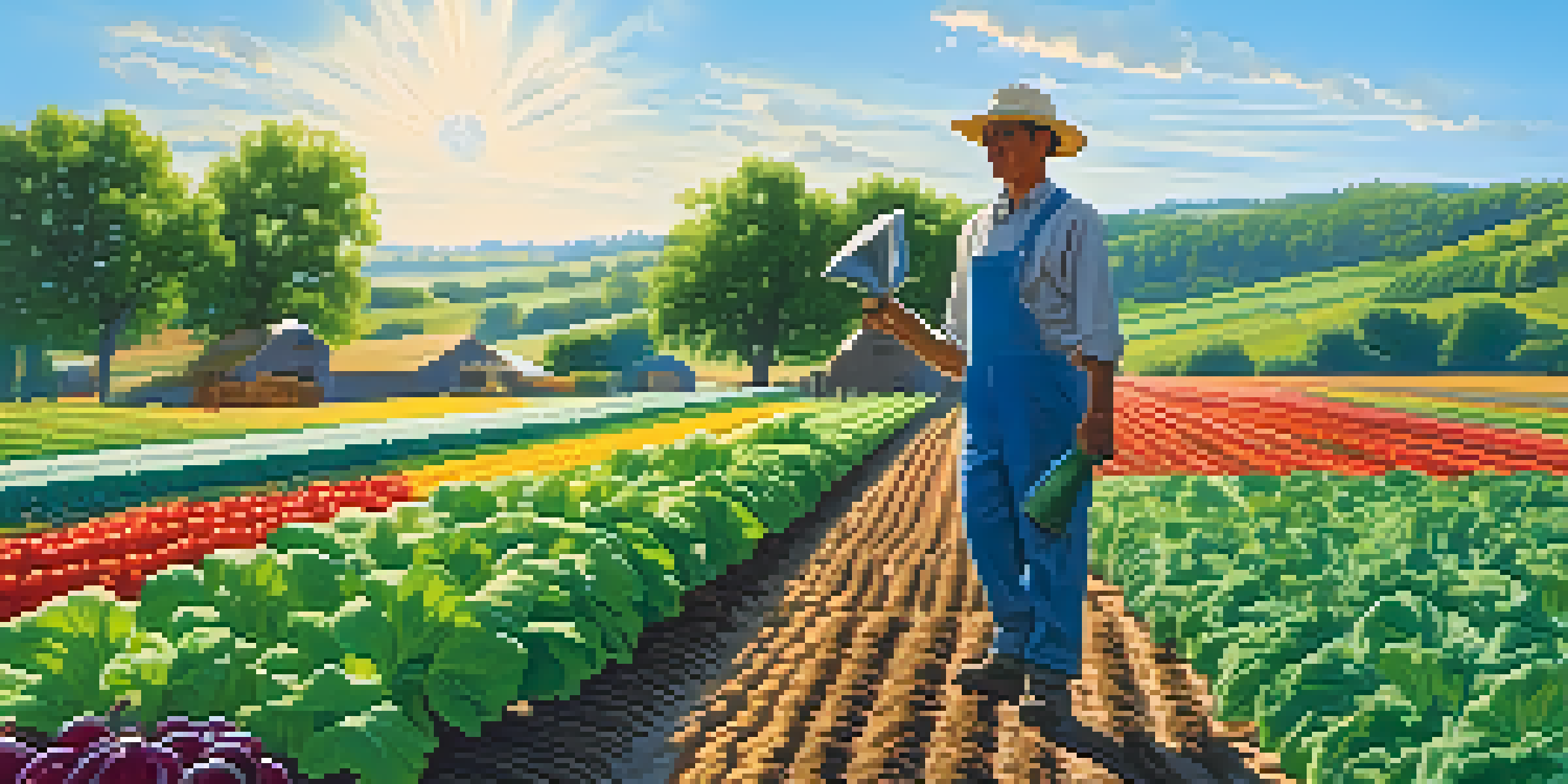The Environmental Impact of Choosing Organic Vegetarian Foods

Understanding Organic Farming and Its Principles
Organic farming is a method that emphasizes sustainability and biodiversity. This approach avoids synthetic pesticides and fertilizers, focusing instead on natural processes. By nurturing the soil and using organic materials, farmers can grow healthier crops that benefit both the ecosystem and consumers.
Organic farming is not a trend; it’s a return to the roots of agriculture—a way to grow food that is healthy for the soil, the plants, and the people.
One of the core principles of organic farming is crop rotation, which helps maintain soil fertility and reduces the risk of pests and diseases. This practice not only supports plant health but also encourages a diverse range of species to thrive in the area. Such diversity can enhance the resilience of local ecosystems against climate change.
By choosing organic vegetarian foods, consumers are indirectly supporting practices that protect wildlife and their habitats. Organic farms often serve as sanctuaries for various species, promoting a balanced ecosystem that benefits us all. So, when you opt for organic, you're making a choice that resonates far beyond your plate.
The Carbon Footprint of Organic Vegetarian Diets
A vegetarian diet generally has a lower carbon footprint compared to one that includes meat. When you choose organic vegetarian foods, this impact can be even more significant. Organic farming practices often result in healthier soil, which can capture more carbon dioxide from the atmosphere.

For instance, studies have shown that organic farming can reduce greenhouse gas emissions by up to 50% compared to conventional farming. This is largely due to the absence of synthetic fertilizers, which can release nitrous oxide, a potent greenhouse gas. By focusing on plant-based foods, you’re contributing to a reduction in overall emissions.
Organic Farming Enhances Soil Health
By avoiding synthetic chemicals, organic farming promotes healthier soil, which is essential for sustainable agriculture and nutritious food production.
Moreover, local organic farms often use sustainable practices that limit transportation emissions. When you buy local organic produce, you're not only eating healthier but also supporting the reduction of your food's carbon footprint. It’s a win-win for both your health and the environment.
Water Conservation Through Organic Practices
Water scarcity is a pressing global issue, and agriculture plays a significant role in water usage. Organic farming techniques, such as mulching and cover cropping, enhance soil moisture retention. This means that less water is needed for irrigation, which is crucial in areas facing drought.
The future of food is organic; it’s about working with nature, not against it.
For example, organic farms tend to have better soil structure due to the absence of synthetic chemicals. This improved structure allows rainwater to infiltrate more effectively, reducing runoff and increasing groundwater recharge. As a result, organic farming can contribute to more sustainable water management practices.
By choosing organic vegetarian foods, you're supporting a system that prioritizes water conservation. Every meal made up of organic ingredients helps in the collective effort to preserve this vital resource. It's a thoughtful choice that benefits not just you, but also future generations.
Biodiversity and Organic Farming's Role
Biodiversity is essential for a healthy planet, and organic farming plays a pivotal role in promoting it. Organic farms often support a variety of crops and livestock, creating habitats for various species. This diversity fosters ecosystems that are more resilient to pests and diseases.
When you choose organic vegetarian foods, you’re encouraging farming practices that prioritize biodiversity. For instance, organic farms often include wildflower strips, hedgerows, and other natural habitats that attract beneficial insects and wildlife. This not only enhances the farming ecosystem but also contributes to the overall health of the environment.
Support Local Economies with Organic
Choosing organic vegetarian foods helps sustain local farmers and economies, fostering community resilience and reducing environmental impact.
Supporting organic vegetarian diets means supporting a system that values ecological balance. By consuming a variety of organic plant-based foods, you’re helping to sustain the planet's rich biodiversity, which is crucial for food security and ecosystem stability.
The Impact of Organic Farming on Soil Health
Soil health is fundamental to sustainable agriculture, and organic farming significantly improves it. By avoiding synthetic chemicals, organic farmers promote a rich ecosystem of microorganisms that contribute to soil fertility. Healthy soil is not only vital for growing crops but also plays a role in carbon sequestration.
For example, practices like composting, green manuring, and reduced tillage help to build soil structure and increase organic matter. This means the soil can better retain nutrients and water, leading to healthier plants. Healthier plants can then produce more nutritious food, benefiting consumers and the environment alike.
When you choose organic vegetarian foods, you’re supporting farming methods that prioritize soil health. This not only enhances food quality but also contributes to a more sustainable agricultural system. It's a conscious decision that benefits both your plate and the planet.
Reducing Chemical Pollution with Organic Choices
One of the significant advantages of organic farming is the reduction of chemical pollutants in our environment. Conventional agriculture often relies on synthetic pesticides and fertilizers that can contaminate water sources and harm wildlife. Organic farming avoids these harmful substances, resulting in cleaner ecosystems.
By choosing organic vegetarian foods, you’re actively participating in the reduction of chemical runoff. This helps protect local waterways and the creatures that depend on them. Reduced chemical usage also means less harm to pollinators, which are essential for food production.
Organic Diets Reduce Carbon Footprint
Opting for organic vegetarian foods significantly lowers greenhouse gas emissions, contributing to a healthier planet.
Ultimately, your food choices can have a ripple effect on the environment. Opting for organic not only nourishes your body but also contributes to a healthier planet by minimizing chemical pollution. It’s a choice that aligns with a vision of sustainability and ecological responsibility.
Supporting Local Economies Through Organic Choices
Choosing organic vegetarian foods often means supporting local farmers and economies. Many organic farms are small-scale operations that rely on community support to thrive. By purchasing organic produce, you’re helping to sustain these local businesses and the jobs they create.
Local organic farming also reduces transportation emissions, as food travels shorter distances from farm to table. This not only benefits the environment but also helps keep money within the community. When you buy from local organic farms, you’re contributing to a more resilient local economy.

In essence, your food choices can have a profound impact beyond your plate. By advocating for organic vegetarian foods, you’re supporting a system that prioritizes local agriculture and sustainability. It’s a powerful way to make a difference in your community and the planet.